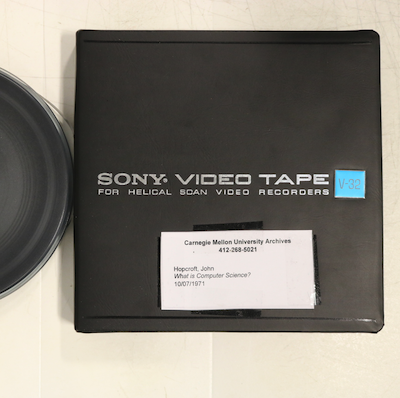
The image from the videotape is blurry, deteriorated from the passage of time, but the professor is razor-sharp as he talks about the future. Herb Simon stands in front of a class at Carnegie Mellon University, musing about the difference between artificial and natural intelligence.
"So I suppose there are some respects in which it makes a difference whether we're talking about artificial or natural intelligence. When I'm in an airplane during a bad rainstorm, I always wonder which I'm being landed by," says Simon. The class laughs, and Simon, bespectacled and wearing a suit and tie, lets out a wry smile.
This is Herb Simon in September of 1971, before he won the Turing Award. Before he won the Nobel Prize in Economic Sciences. Before he was widely heralded as a pioneer in artificial intelligence.
Thanks to the University Archives' renewed investment in audiovisual preservation, the public can watch a digital recording of that magical moment, one of many recorded at CMU between 1970 and 1993. Some 400 videotapes make up the Computer Science Videotape Collection, which captures the early, heady days of the field when a group of visionaries converged on a depressed steel town and through their research and collaboration, defined the very essence of modern life. These historic documents exude the sense of excitement and infinite possibilities during the formative years of the Computer Science Department and document the profound role of the School of Computer Science in defining the field.
To date, archivists have digitized 30 tapes, including recordings of Allen Newell, Raj Reddy, Alan Perlis and other SCS pioneers. A portion of these can be viewed on the University Archives' Vimeo Channel. Other tapes highlight speakers and thought leaders from around the world who came to CMU to lecture or serve as visiting professors. Another 20 videos have been slated to be digitized by Preservation Technologies, a Cranberry Township-based company. But the process is expensive, leaving approximately 350 videos vulnerable to deterioration. Each hour-long tape costs about $250 to digitize, and the archivists hope to complete the project of digitizing them within the next three to four years.
"It's really important that we do this as soon as possible, before they degrade even further or it becomes too cost prohibitive," said Emily Davis, archivist at Carnegie Mellon. "Some of the tapes are so fragile and unstable. Some have mold that can eat away information on the tape."
One of the videotapes captures Allen Newell, a Turing award winner in 1975, giving his famous "Desires and Diversions" lecture about dealing with the distraction of life while still pursuing his passion for research. In the question-and-answer segment, Newell commands the classroom, speaking with remarkable dynamism and animation.
"I learned what a fabulous teacher Allen Newell was," said Katherine Barbera, archivist and oral historian at Carnegie Mellon. "He had this wonderful personality and a good sense of humor."
In another video, Mary Shaw, then a young Ph.D. student, introduces a lecture by Alan Perlis, the first winner of the Turing award in 1966 and head of the Computer Science Department. Shaw would go on to become a legend in her own right as founder of the Software Engineering Institute and now the A.J. Perlis Professor of Computer Science.
"These tapes bring history to life for current and future generations in a way that other archival materials, notes, letters, emails, code and even photographs simply can't," Barbera said. "The tapes really help the students grasp the legacy that they're inheriting."
Read the rest of this article at The Link.
